An Analysis of Palliative Care Strategies for Cancer Related Fatigue
VerifiedAdded on 2020/10/05
|12
|4063
|430
Report
AI Summary
This report provides an in-depth analysis of palliative care, specifically focusing on cancer-related fatigue. It begins with an introduction to the project, defining palliative care and its significance in improving the quality of life for individuals suffering from serious illnesses, including cancer. The report delves into the causes and symptoms of cancer-related fatigue, differentiating it from everyday tiredness and highlighting its impact on patients' physical, mental, and emotional well-being. It explores various aspects of palliative management, including nursing assessments, supportive interventions, and the role of palliative care services in addressing fatigue. The report emphasizes the importance of symptom control, psychosocial care, and personalized management plans. It also discusses the causes and effects of cancer-related fatigue, along with the role of nursing assessment in managing it. The report concludes by summarizing the key findings and emphasizing the need for comprehensive palliative care strategies to effectively manage cancer-related fatigue and improve patient outcomes.
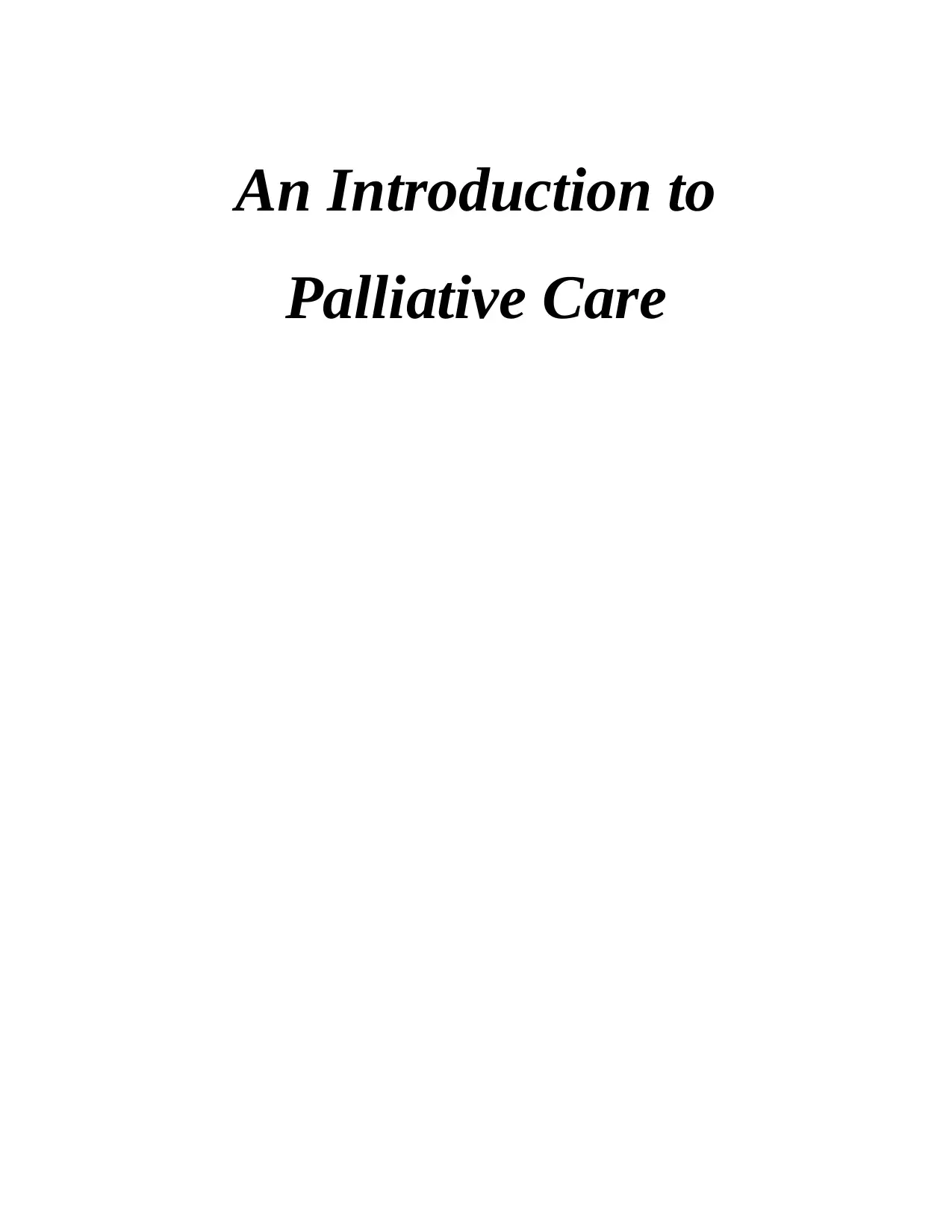
An Introduction to
Palliative Care
Palliative Care
Paraphrase This Document
Need a fresh take? Get an instant paraphrase of this document with our AI Paraphraser
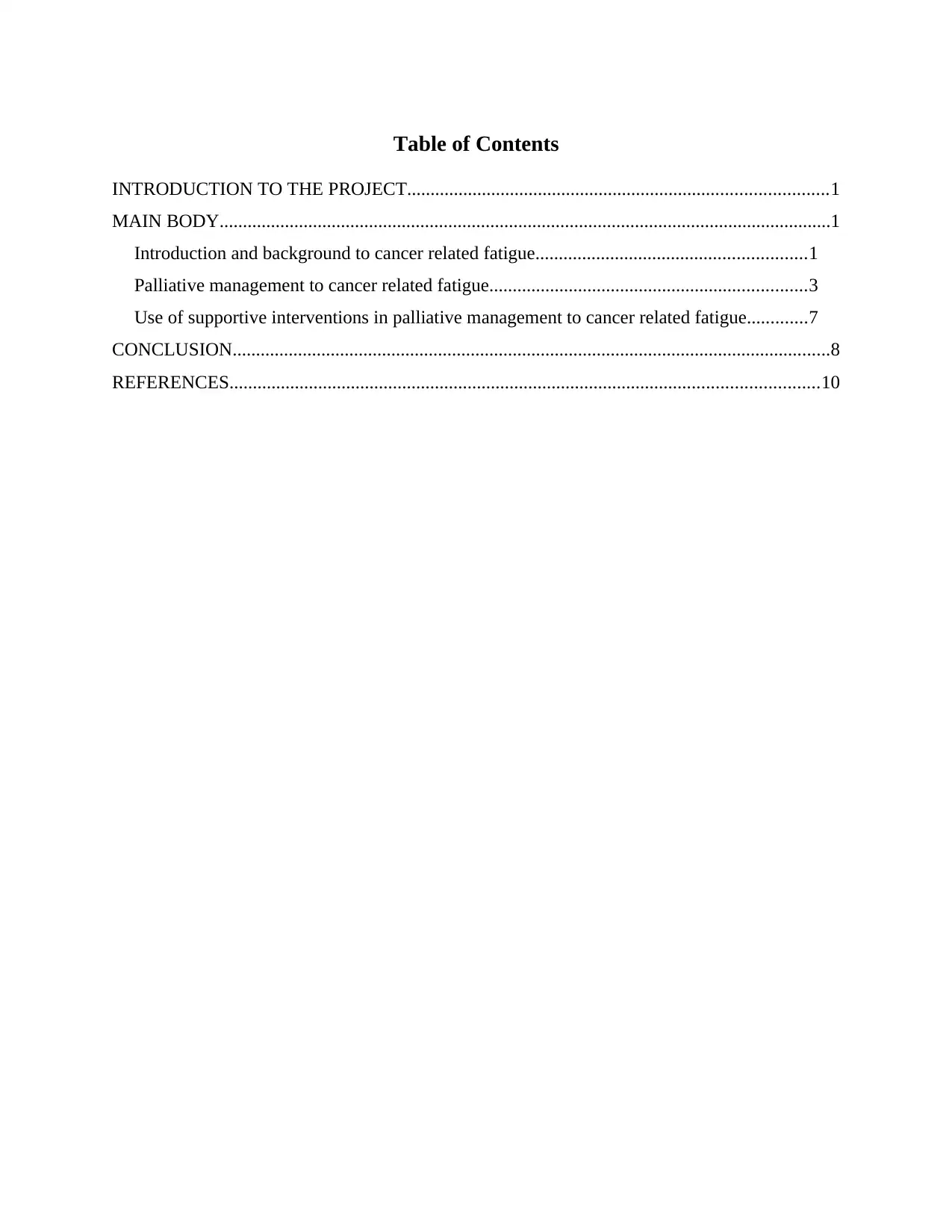
Table of Contents
INTRODUCTION TO THE PROJECT..........................................................................................1
MAIN BODY...................................................................................................................................1
Introduction and background to cancer related fatigue..........................................................1
Palliative management to cancer related fatigue....................................................................3
Use of supportive interventions in palliative management to cancer related fatigue.............7
CONCLUSION................................................................................................................................8
REFERENCES..............................................................................................................................10
INTRODUCTION TO THE PROJECT..........................................................................................1
MAIN BODY...................................................................................................................................1
Introduction and background to cancer related fatigue..........................................................1
Palliative management to cancer related fatigue....................................................................3
Use of supportive interventions in palliative management to cancer related fatigue.............7
CONCLUSION................................................................................................................................8
REFERENCES..............................................................................................................................10
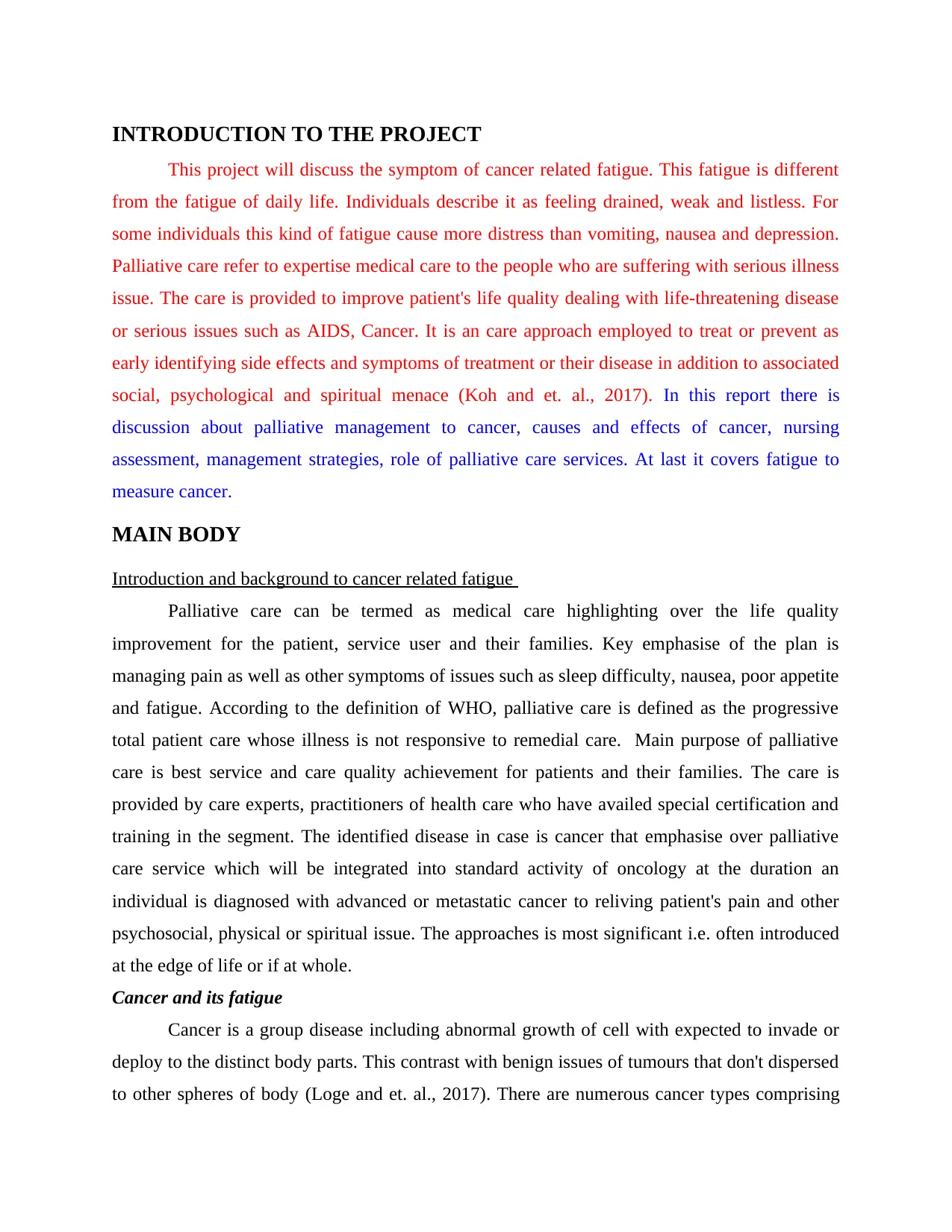
INTRODUCTION TO THE PROJECT
This project will discuss the symptom of cancer related fatigue. This fatigue is different
from the fatigue of daily life. Individuals describe it as feeling drained, weak and listless. For
some individuals this kind of fatigue cause more distress than vomiting, nausea and depression.
Palliative care refer to expertise medical care to the people who are suffering with serious illness
issue. The care is provided to improve patient's life quality dealing with life-threatening disease
or serious issues such as AIDS, Cancer. It is an care approach employed to treat or prevent as
early identifying side effects and symptoms of treatment or their disease in addition to associated
social, psychological and spiritual menace (Koh and et. al., 2017). In this report there is
discussion about palliative management to cancer, causes and effects of cancer, nursing
assessment, management strategies, role of palliative care services. At last it covers fatigue to
measure cancer.
MAIN BODY
Introduction and background to cancer related fatigue
Palliative care can be termed as medical care highlighting over the life quality
improvement for the patient, service user and their families. Key emphasise of the plan is
managing pain as well as other symptoms of issues such as sleep difficulty, nausea, poor appetite
and fatigue. According to the definition of WHO, palliative care is defined as the progressive
total patient care whose illness is not responsive to remedial care. Main purpose of palliative
care is best service and care quality achievement for patients and their families. The care is
provided by care experts, practitioners of health care who have availed special certification and
training in the segment. The identified disease in case is cancer that emphasise over palliative
care service which will be integrated into standard activity of oncology at the duration an
individual is diagnosed with advanced or metastatic cancer to reliving patient's pain and other
psychosocial, physical or spiritual issue. The approaches is most significant i.e. often introduced
at the edge of life or if at whole.
Cancer and its fatigue
Cancer is a group disease including abnormal growth of cell with expected to invade or
deploy to the distinct body parts. This contrast with benign issues of tumours that don't dispersed
to other spheres of body (Loge and et. al., 2017). There are numerous cancer types comprising
This project will discuss the symptom of cancer related fatigue. This fatigue is different
from the fatigue of daily life. Individuals describe it as feeling drained, weak and listless. For
some individuals this kind of fatigue cause more distress than vomiting, nausea and depression.
Palliative care refer to expertise medical care to the people who are suffering with serious illness
issue. The care is provided to improve patient's life quality dealing with life-threatening disease
or serious issues such as AIDS, Cancer. It is an care approach employed to treat or prevent as
early identifying side effects and symptoms of treatment or their disease in addition to associated
social, psychological and spiritual menace (Koh and et. al., 2017). In this report there is
discussion about palliative management to cancer, causes and effects of cancer, nursing
assessment, management strategies, role of palliative care services. At last it covers fatigue to
measure cancer.
MAIN BODY
Introduction and background to cancer related fatigue
Palliative care can be termed as medical care highlighting over the life quality
improvement for the patient, service user and their families. Key emphasise of the plan is
managing pain as well as other symptoms of issues such as sleep difficulty, nausea, poor appetite
and fatigue. According to the definition of WHO, palliative care is defined as the progressive
total patient care whose illness is not responsive to remedial care. Main purpose of palliative
care is best service and care quality achievement for patients and their families. The care is
provided by care experts, practitioners of health care who have availed special certification and
training in the segment. The identified disease in case is cancer that emphasise over palliative
care service which will be integrated into standard activity of oncology at the duration an
individual is diagnosed with advanced or metastatic cancer to reliving patient's pain and other
psychosocial, physical or spiritual issue. The approaches is most significant i.e. often introduced
at the edge of life or if at whole.
Cancer and its fatigue
Cancer is a group disease including abnormal growth of cell with expected to invade or
deploy to the distinct body parts. This contrast with benign issues of tumours that don't dispersed
to other spheres of body (Loge and et. al., 2017). There are numerous cancer types comprising
⊘ This is a preview!⊘
Do you want full access?
Subscribe today to unlock all pages.

Trusted by 1+ million students worldwide
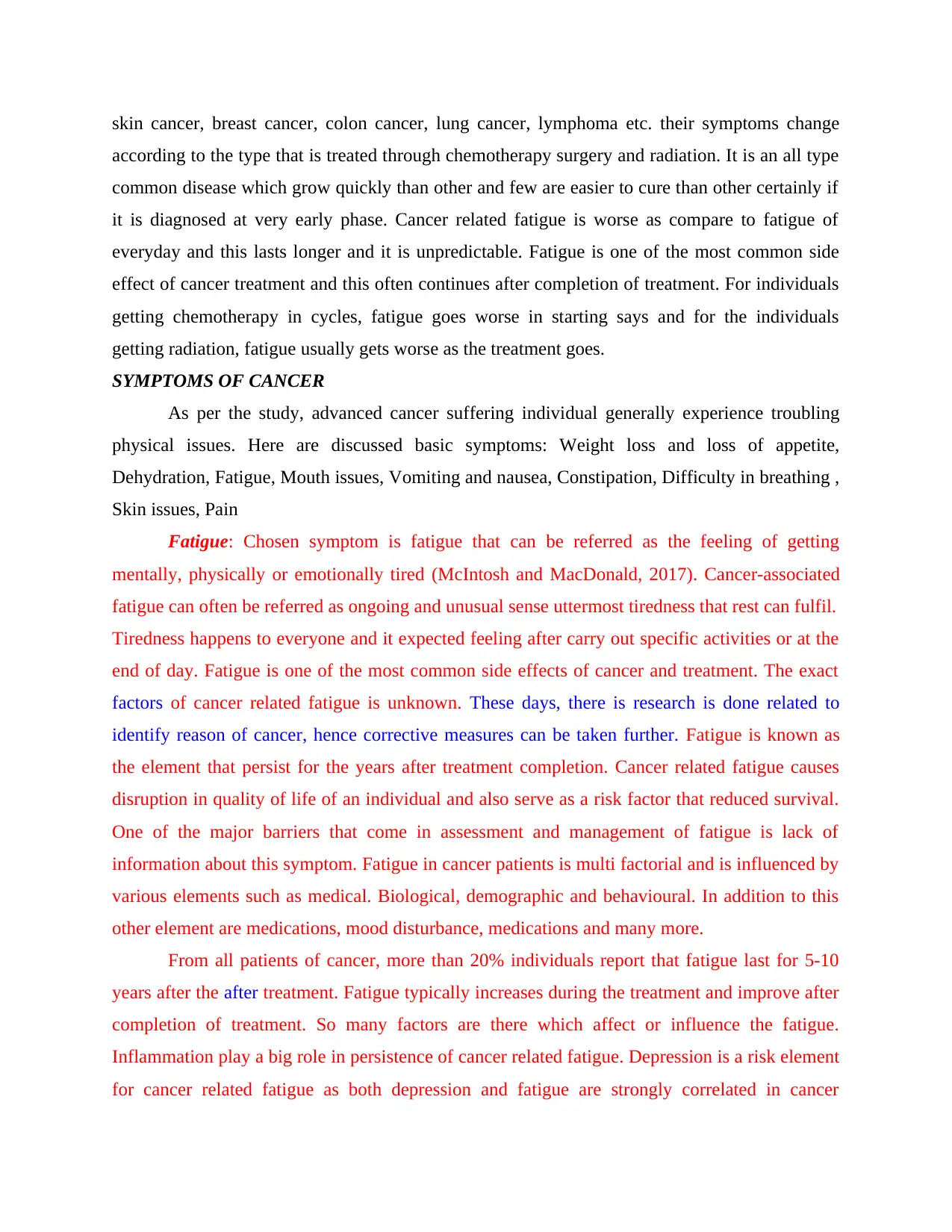
skin cancer, breast cancer, colon cancer, lung cancer, lymphoma etc. their symptoms change
according to the type that is treated through chemotherapy surgery and radiation. It is an all type
common disease which grow quickly than other and few are easier to cure than other certainly if
it is diagnosed at very early phase. Cancer related fatigue is worse as compare to fatigue of
everyday and this lasts longer and it is unpredictable. Fatigue is one of the most common side
effect of cancer treatment and this often continues after completion of treatment. For individuals
getting chemotherapy in cycles, fatigue goes worse in starting says and for the individuals
getting radiation, fatigue usually gets worse as the treatment goes.
SYMPTOMS OF CANCER
As per the study, advanced cancer suffering individual generally experience troubling
physical issues. Here are discussed basic symptoms: Weight loss and loss of appetite,
Dehydration, Fatigue, Mouth issues, Vomiting and nausea, Constipation, Difficulty in breathing ,
Skin issues, Pain
Fatigue: Chosen symptom is fatigue that can be referred as the feeling of getting
mentally, physically or emotionally tired (McIntosh and MacDonald, 2017). Cancer-associated
fatigue can often be referred as ongoing and unusual sense uttermost tiredness that rest can fulfil.
Tiredness happens to everyone and it expected feeling after carry out specific activities or at the
end of day. Fatigue is one of the most common side effects of cancer and treatment. The exact
factors of cancer related fatigue is unknown. These days, there is research is done related to
identify reason of cancer, hence corrective measures can be taken further. Fatigue is known as
the element that persist for the years after treatment completion. Cancer related fatigue causes
disruption in quality of life of an individual and also serve as a risk factor that reduced survival.
One of the major barriers that come in assessment and management of fatigue is lack of
information about this symptom. Fatigue in cancer patients is multi factorial and is influenced by
various elements such as medical. Biological, demographic and behavioural. In addition to this
other element are medications, mood disturbance, medications and many more.
From all patients of cancer, more than 20% individuals report that fatigue last for 5-10
years after the after treatment. Fatigue typically increases during the treatment and improve after
completion of treatment. So many factors are there which affect or influence the fatigue.
Inflammation play a big role in persistence of cancer related fatigue. Depression is a risk element
for cancer related fatigue as both depression and fatigue are strongly correlated in cancer
according to the type that is treated through chemotherapy surgery and radiation. It is an all type
common disease which grow quickly than other and few are easier to cure than other certainly if
it is diagnosed at very early phase. Cancer related fatigue is worse as compare to fatigue of
everyday and this lasts longer and it is unpredictable. Fatigue is one of the most common side
effect of cancer treatment and this often continues after completion of treatment. For individuals
getting chemotherapy in cycles, fatigue goes worse in starting says and for the individuals
getting radiation, fatigue usually gets worse as the treatment goes.
SYMPTOMS OF CANCER
As per the study, advanced cancer suffering individual generally experience troubling
physical issues. Here are discussed basic symptoms: Weight loss and loss of appetite,
Dehydration, Fatigue, Mouth issues, Vomiting and nausea, Constipation, Difficulty in breathing ,
Skin issues, Pain
Fatigue: Chosen symptom is fatigue that can be referred as the feeling of getting
mentally, physically or emotionally tired (McIntosh and MacDonald, 2017). Cancer-associated
fatigue can often be referred as ongoing and unusual sense uttermost tiredness that rest can fulfil.
Tiredness happens to everyone and it expected feeling after carry out specific activities or at the
end of day. Fatigue is one of the most common side effects of cancer and treatment. The exact
factors of cancer related fatigue is unknown. These days, there is research is done related to
identify reason of cancer, hence corrective measures can be taken further. Fatigue is known as
the element that persist for the years after treatment completion. Cancer related fatigue causes
disruption in quality of life of an individual and also serve as a risk factor that reduced survival.
One of the major barriers that come in assessment and management of fatigue is lack of
information about this symptom. Fatigue in cancer patients is multi factorial and is influenced by
various elements such as medical. Biological, demographic and behavioural. In addition to this
other element are medications, mood disturbance, medications and many more.
From all patients of cancer, more than 20% individuals report that fatigue last for 5-10
years after the after treatment. Fatigue typically increases during the treatment and improve after
completion of treatment. So many factors are there which affect or influence the fatigue.
Inflammation play a big role in persistence of cancer related fatigue. Depression is a risk element
for cancer related fatigue as both depression and fatigue are strongly correlated in cancer
Paraphrase This Document
Need a fresh take? Get an instant paraphrase of this document with our AI Paraphraser
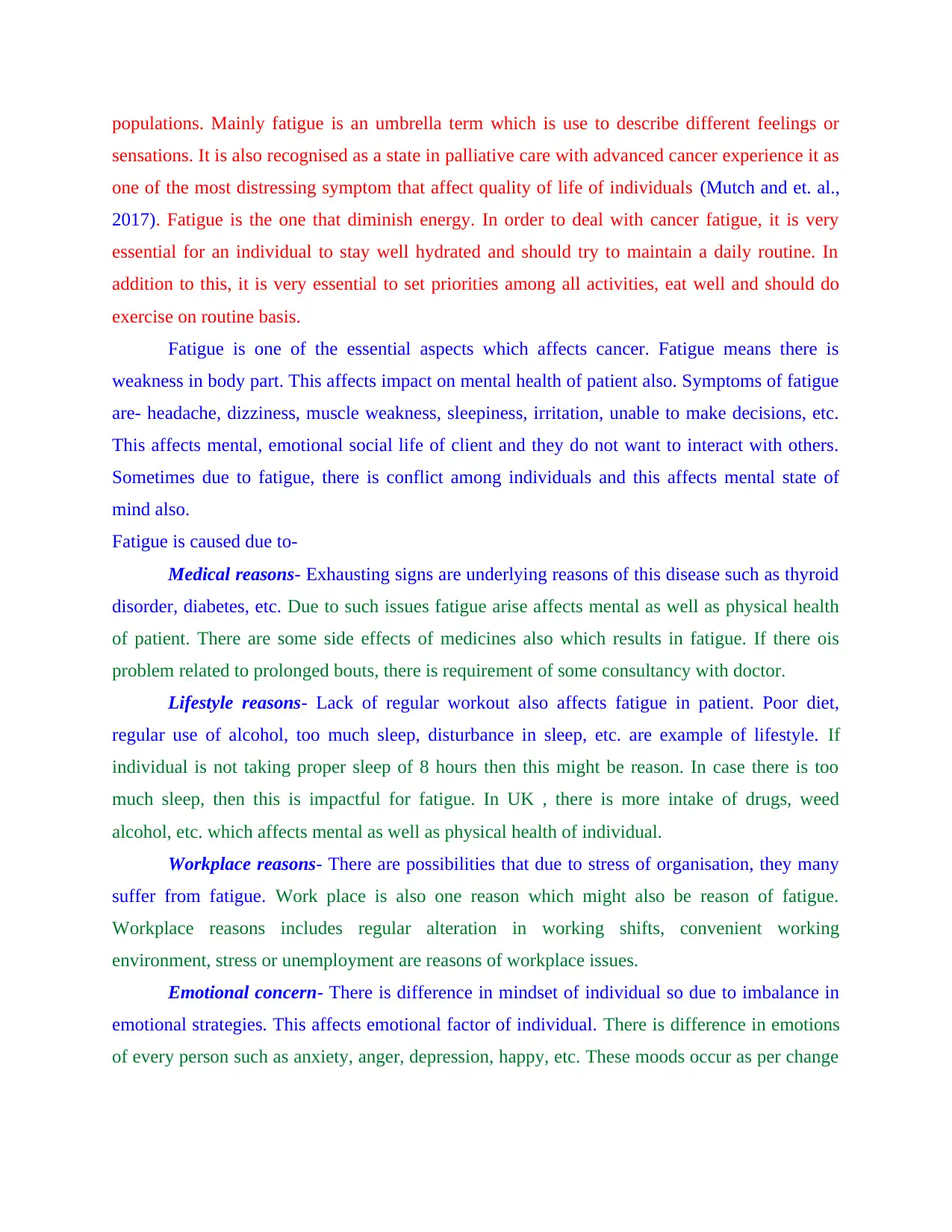
populations. Mainly fatigue is an umbrella term which is use to describe different feelings or
sensations. It is also recognised as a state in palliative care with advanced cancer experience it as
one of the most distressing symptom that affect quality of life of individuals (Mutch and et. al.,
2017). Fatigue is the one that diminish energy. In order to deal with cancer fatigue, it is very
essential for an individual to stay well hydrated and should try to maintain a daily routine. In
addition to this, it is very essential to set priorities among all activities, eat well and should do
exercise on routine basis.
Fatigue is one of the essential aspects which affects cancer. Fatigue means there is
weakness in body part. This affects impact on mental health of patient also. Symptoms of fatigue
are- headache, dizziness, muscle weakness, sleepiness, irritation, unable to make decisions, etc.
This affects mental, emotional social life of client and they do not want to interact with others.
Sometimes due to fatigue, there is conflict among individuals and this affects mental state of
mind also.
Fatigue is caused due to-
Medical reasons- Exhausting signs are underlying reasons of this disease such as thyroid
disorder, diabetes, etc. Due to such issues fatigue arise affects mental as well as physical health
of patient. There are some side effects of medicines also which results in fatigue. If there ois
problem related to prolonged bouts, there is requirement of some consultancy with doctor.
Lifestyle reasons- Lack of regular workout also affects fatigue in patient. Poor diet,
regular use of alcohol, too much sleep, disturbance in sleep, etc. are example of lifestyle. If
individual is not taking proper sleep of 8 hours then this might be reason. In case there is too
much sleep, then this is impactful for fatigue. In UK , there is more intake of drugs, weed
alcohol, etc. which affects mental as well as physical health of individual.
Workplace reasons- There are possibilities that due to stress of organisation, they many
suffer from fatigue. Work place is also one reason which might also be reason of fatigue.
Workplace reasons includes regular alteration in working shifts, convenient working
environment, stress or unemployment are reasons of workplace issues.
Emotional concern- There is difference in mindset of individual so due to imbalance in
emotional strategies. This affects emotional factor of individual. There is difference in emotions
of every person such as anxiety, anger, depression, happy, etc. These moods occur as per change
sensations. It is also recognised as a state in palliative care with advanced cancer experience it as
one of the most distressing symptom that affect quality of life of individuals (Mutch and et. al.,
2017). Fatigue is the one that diminish energy. In order to deal with cancer fatigue, it is very
essential for an individual to stay well hydrated and should try to maintain a daily routine. In
addition to this, it is very essential to set priorities among all activities, eat well and should do
exercise on routine basis.
Fatigue is one of the essential aspects which affects cancer. Fatigue means there is
weakness in body part. This affects impact on mental health of patient also. Symptoms of fatigue
are- headache, dizziness, muscle weakness, sleepiness, irritation, unable to make decisions, etc.
This affects mental, emotional social life of client and they do not want to interact with others.
Sometimes due to fatigue, there is conflict among individuals and this affects mental state of
mind also.
Fatigue is caused due to-
Medical reasons- Exhausting signs are underlying reasons of this disease such as thyroid
disorder, diabetes, etc. Due to such issues fatigue arise affects mental as well as physical health
of patient. There are some side effects of medicines also which results in fatigue. If there ois
problem related to prolonged bouts, there is requirement of some consultancy with doctor.
Lifestyle reasons- Lack of regular workout also affects fatigue in patient. Poor diet,
regular use of alcohol, too much sleep, disturbance in sleep, etc. are example of lifestyle. If
individual is not taking proper sleep of 8 hours then this might be reason. In case there is too
much sleep, then this is impactful for fatigue. In UK , there is more intake of drugs, weed
alcohol, etc. which affects mental as well as physical health of individual.
Workplace reasons- There are possibilities that due to stress of organisation, they many
suffer from fatigue. Work place is also one reason which might also be reason of fatigue.
Workplace reasons includes regular alteration in working shifts, convenient working
environment, stress or unemployment are reasons of workplace issues.
Emotional concern- There is difference in mindset of individual so due to imbalance in
emotional strategies. This affects emotional factor of individual. There is difference in emotions
of every person such as anxiety, anger, depression, happy, etc. These moods occur as per change
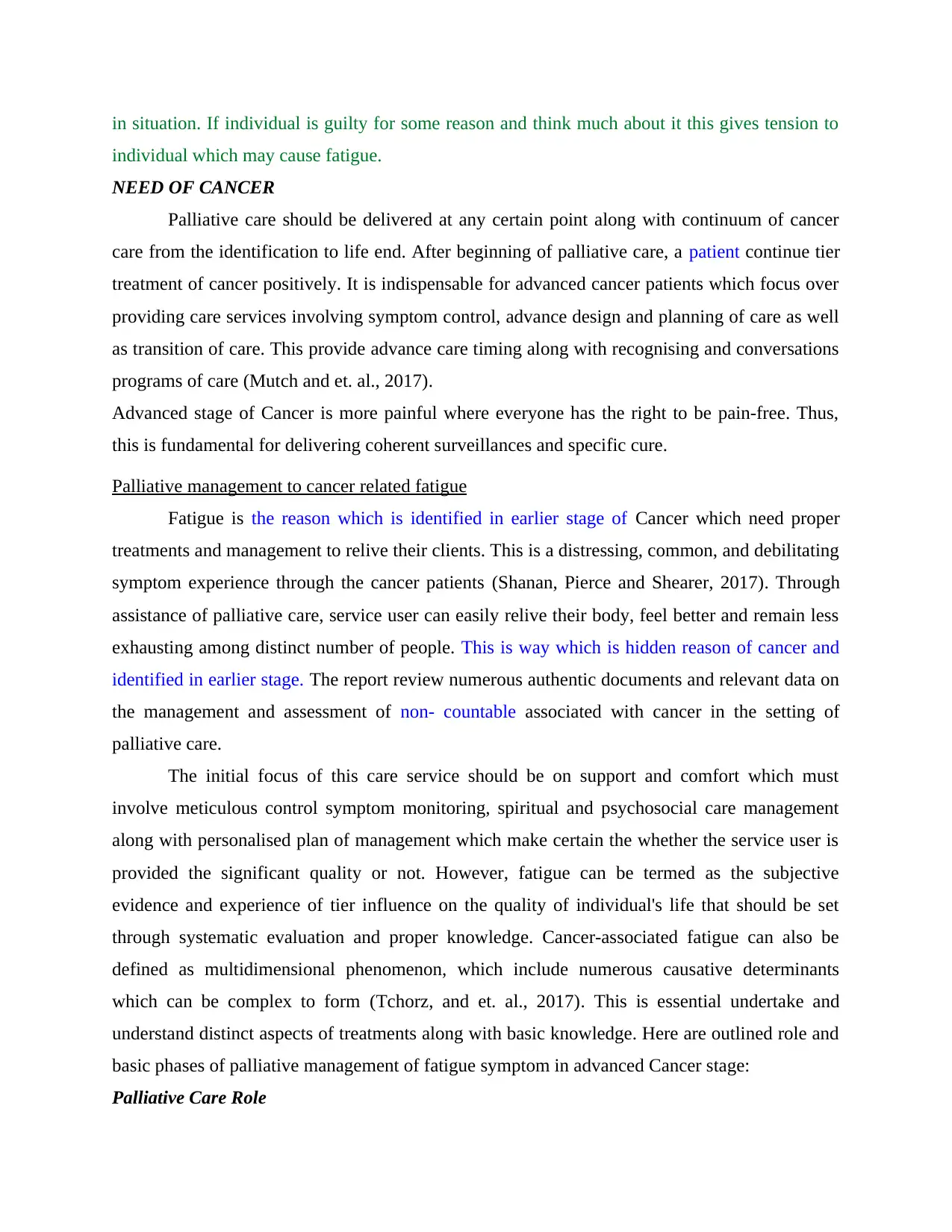
in situation. If individual is guilty for some reason and think much about it this gives tension to
individual which may cause fatigue.
NEED OF CANCER
Palliative care should be delivered at any certain point along with continuum of cancer
care from the identification to life end. After beginning of palliative care, a patient continue tier
treatment of cancer positively. It is indispensable for advanced cancer patients which focus over
providing care services involving symptom control, advance design and planning of care as well
as transition of care. This provide advance care timing along with recognising and conversations
programs of care (Mutch and et. al., 2017).
Advanced stage of Cancer is more painful where everyone has the right to be pain-free. Thus,
this is fundamental for delivering coherent surveillances and specific cure.
Palliative management to cancer related fatigue
Fatigue is the reason which is identified in earlier stage of Cancer which need proper
treatments and management to relive their clients. This is a distressing, common, and debilitating
symptom experience through the cancer patients (Shanan, Pierce and Shearer, 2017). Through
assistance of palliative care, service user can easily relive their body, feel better and remain less
exhausting among distinct number of people. This is way which is hidden reason of cancer and
identified in earlier stage. The report review numerous authentic documents and relevant data on
the management and assessment of non- countable associated with cancer in the setting of
palliative care.
The initial focus of this care service should be on support and comfort which must
involve meticulous control symptom monitoring, spiritual and psychosocial care management
along with personalised plan of management which make certain the whether the service user is
provided the significant quality or not. However, fatigue can be termed as the subjective
evidence and experience of tier influence on the quality of individual's life that should be set
through systematic evaluation and proper knowledge. Cancer-associated fatigue can also be
defined as multidimensional phenomenon, which include numerous causative determinants
which can be complex to form (Tchorz, and et. al., 2017). This is essential undertake and
understand distinct aspects of treatments along with basic knowledge. Here are outlined role and
basic phases of palliative management of fatigue symptom in advanced Cancer stage:
Palliative Care Role
individual which may cause fatigue.
NEED OF CANCER
Palliative care should be delivered at any certain point along with continuum of cancer
care from the identification to life end. After beginning of palliative care, a patient continue tier
treatment of cancer positively. It is indispensable for advanced cancer patients which focus over
providing care services involving symptom control, advance design and planning of care as well
as transition of care. This provide advance care timing along with recognising and conversations
programs of care (Mutch and et. al., 2017).
Advanced stage of Cancer is more painful where everyone has the right to be pain-free. Thus,
this is fundamental for delivering coherent surveillances and specific cure.
Palliative management to cancer related fatigue
Fatigue is the reason which is identified in earlier stage of Cancer which need proper
treatments and management to relive their clients. This is a distressing, common, and debilitating
symptom experience through the cancer patients (Shanan, Pierce and Shearer, 2017). Through
assistance of palliative care, service user can easily relive their body, feel better and remain less
exhausting among distinct number of people. This is way which is hidden reason of cancer and
identified in earlier stage. The report review numerous authentic documents and relevant data on
the management and assessment of non- countable associated with cancer in the setting of
palliative care.
The initial focus of this care service should be on support and comfort which must
involve meticulous control symptom monitoring, spiritual and psychosocial care management
along with personalised plan of management which make certain the whether the service user is
provided the significant quality or not. However, fatigue can be termed as the subjective
evidence and experience of tier influence on the quality of individual's life that should be set
through systematic evaluation and proper knowledge. Cancer-associated fatigue can also be
defined as multidimensional phenomenon, which include numerous causative determinants
which can be complex to form (Tchorz, and et. al., 2017). This is essential undertake and
understand distinct aspects of treatments along with basic knowledge. Here are outlined role and
basic phases of palliative management of fatigue symptom in advanced Cancer stage:
Palliative Care Role
⊘ This is a preview!⊘
Do you want full access?
Subscribe today to unlock all pages.

Trusted by 1+ million students worldwide
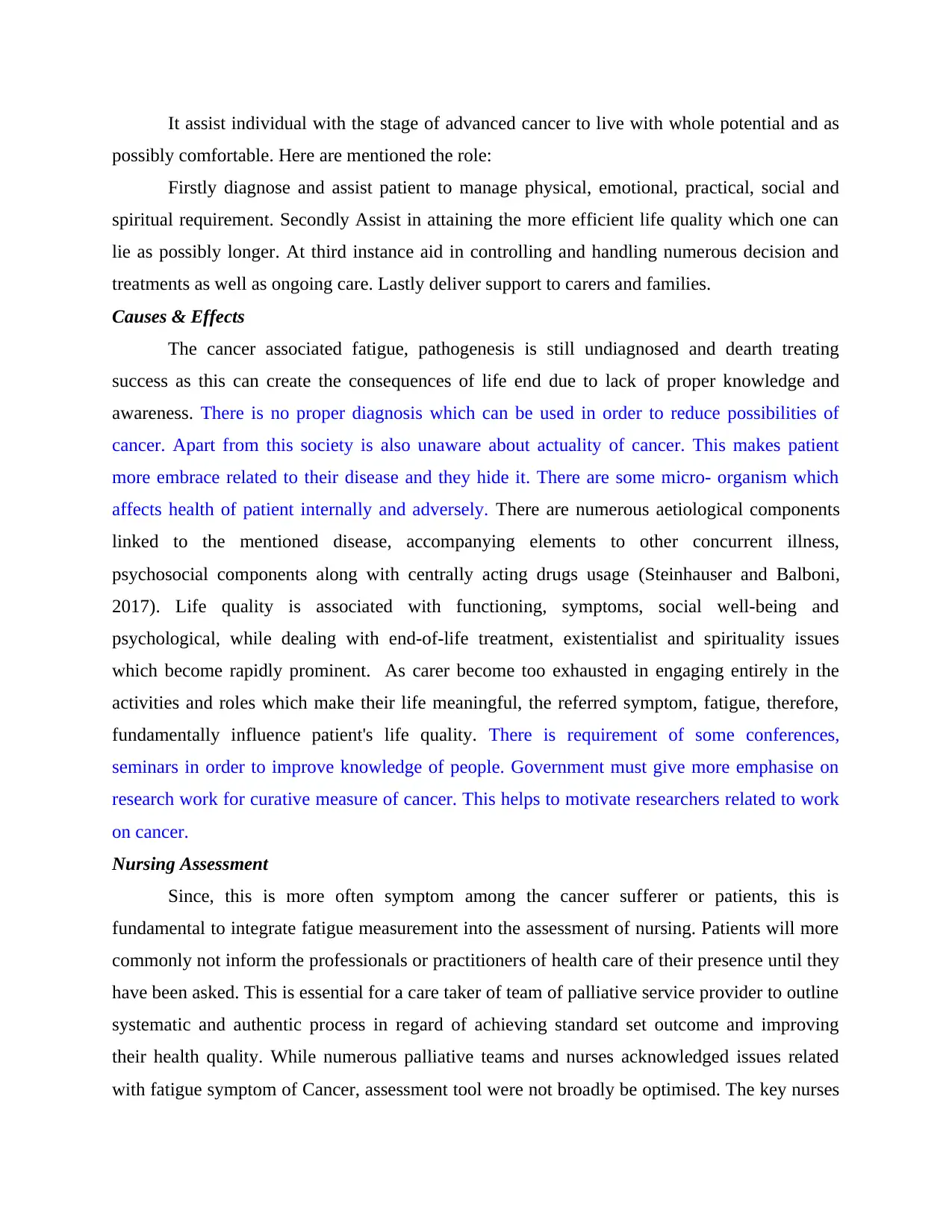
It assist individual with the stage of advanced cancer to live with whole potential and as
possibly comfortable. Here are mentioned the role:
Firstly diagnose and assist patient to manage physical, emotional, practical, social and
spiritual requirement. Secondly Assist in attaining the more efficient life quality which one can
lie as possibly longer. At third instance aid in controlling and handling numerous decision and
treatments as well as ongoing care. Lastly deliver support to carers and families.
Causes & Effects
The cancer associated fatigue, pathogenesis is still undiagnosed and dearth treating
success as this can create the consequences of life end due to lack of proper knowledge and
awareness. There is no proper diagnosis which can be used in order to reduce possibilities of
cancer. Apart from this society is also unaware about actuality of cancer. This makes patient
more embrace related to their disease and they hide it. There are some micro- organism which
affects health of patient internally and adversely. There are numerous aetiological components
linked to the mentioned disease, accompanying elements to other concurrent illness,
psychosocial components along with centrally acting drugs usage (Steinhauser and Balboni,
2017). Life quality is associated with functioning, symptoms, social well-being and
psychological, while dealing with end-of-life treatment, existentialist and spirituality issues
which become rapidly prominent. As carer become too exhausted in engaging entirely in the
activities and roles which make their life meaningful, the referred symptom, fatigue, therefore,
fundamentally influence patient's life quality. There is requirement of some conferences,
seminars in order to improve knowledge of people. Government must give more emphasise on
research work for curative measure of cancer. This helps to motivate researchers related to work
on cancer.
Nursing Assessment
Since, this is more often symptom among the cancer sufferer or patients, this is
fundamental to integrate fatigue measurement into the assessment of nursing. Patients will more
commonly not inform the professionals or practitioners of health care of their presence until they
have been asked. This is essential for a care taker of team of palliative service provider to outline
systematic and authentic process in regard of achieving standard set outcome and improving
their health quality. While numerous palliative teams and nurses acknowledged issues related
with fatigue symptom of Cancer, assessment tool were not broadly be optimised. The key nurses
possibly comfortable. Here are mentioned the role:
Firstly diagnose and assist patient to manage physical, emotional, practical, social and
spiritual requirement. Secondly Assist in attaining the more efficient life quality which one can
lie as possibly longer. At third instance aid in controlling and handling numerous decision and
treatments as well as ongoing care. Lastly deliver support to carers and families.
Causes & Effects
The cancer associated fatigue, pathogenesis is still undiagnosed and dearth treating
success as this can create the consequences of life end due to lack of proper knowledge and
awareness. There is no proper diagnosis which can be used in order to reduce possibilities of
cancer. Apart from this society is also unaware about actuality of cancer. This makes patient
more embrace related to their disease and they hide it. There are some micro- organism which
affects health of patient internally and adversely. There are numerous aetiological components
linked to the mentioned disease, accompanying elements to other concurrent illness,
psychosocial components along with centrally acting drugs usage (Steinhauser and Balboni,
2017). Life quality is associated with functioning, symptoms, social well-being and
psychological, while dealing with end-of-life treatment, existentialist and spirituality issues
which become rapidly prominent. As carer become too exhausted in engaging entirely in the
activities and roles which make their life meaningful, the referred symptom, fatigue, therefore,
fundamentally influence patient's life quality. There is requirement of some conferences,
seminars in order to improve knowledge of people. Government must give more emphasise on
research work for curative measure of cancer. This helps to motivate researchers related to work
on cancer.
Nursing Assessment
Since, this is more often symptom among the cancer sufferer or patients, this is
fundamental to integrate fatigue measurement into the assessment of nursing. Patients will more
commonly not inform the professionals or practitioners of health care of their presence until they
have been asked. This is essential for a care taker of team of palliative service provider to outline
systematic and authentic process in regard of achieving standard set outcome and improving
their health quality. While numerous palliative teams and nurses acknowledged issues related
with fatigue symptom of Cancer, assessment tool were not broadly be optimised. The key nurses
Paraphrase This Document
Need a fresh take? Get an instant paraphrase of this document with our AI Paraphraser
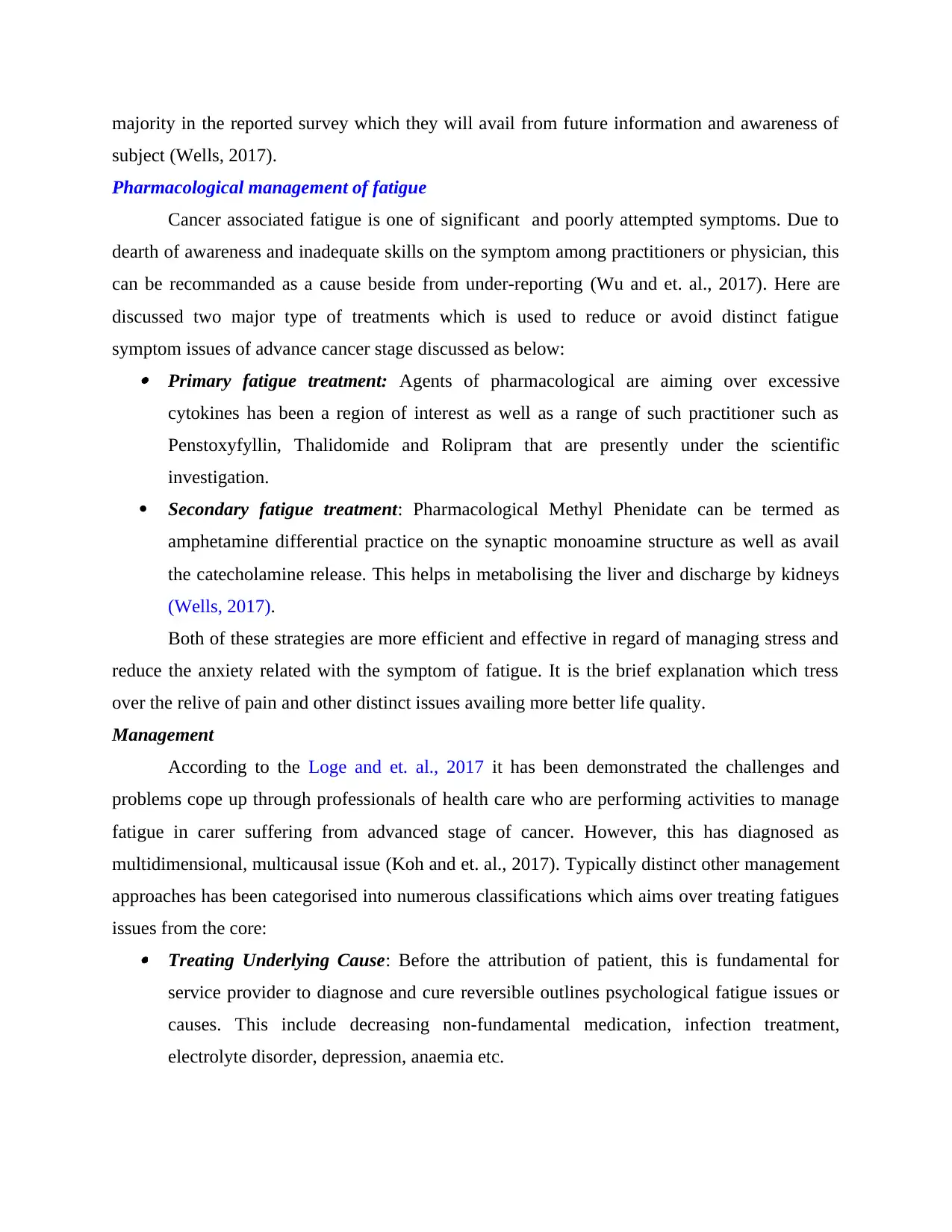
majority in the reported survey which they will avail from future information and awareness of
subject (Wells, 2017).
Pharmacological management of fatigue
Cancer associated fatigue is one of significant and poorly attempted symptoms. Due to
dearth of awareness and inadequate skills on the symptom among practitioners or physician, this
can be recommanded as a cause beside from under-reporting (Wu and et. al., 2017). Here are
discussed two major type of treatments which is used to reduce or avoid distinct fatigue
symptom issues of advance cancer stage discussed as below: Primary fatigue treatment: Agents of pharmacological are aiming over excessive
cytokines has been a region of interest as well as a range of such practitioner such as
Penstoxyfyllin, Thalidomide and Rolipram that are presently under the scientific
investigation.
Secondary fatigue treatment: Pharmacological Methyl Phenidate can be termed as
amphetamine differential practice on the synaptic monoamine structure as well as avail
the catecholamine release. This helps in metabolising the liver and discharge by kidneys
(Wells, 2017).
Both of these strategies are more efficient and effective in regard of managing stress and
reduce the anxiety related with the symptom of fatigue. It is the brief explanation which tress
over the relive of pain and other distinct issues availing more better life quality.
Management
According to the Loge and et. al., 2017 it has been demonstrated the challenges and
problems cope up through professionals of health care who are performing activities to manage
fatigue in carer suffering from advanced stage of cancer. However, this has diagnosed as
multidimensional, multicausal issue (Koh and et. al., 2017). Typically distinct other management
approaches has been categorised into numerous classifications which aims over treating fatigues
issues from the core: Treating Underlying Cause: Before the attribution of patient, this is fundamental for
service provider to diagnose and cure reversible outlines psychological fatigue issues or
causes. This include decreasing non-fundamental medication, infection treatment,
electrolyte disorder, depression, anaemia etc.
subject (Wells, 2017).
Pharmacological management of fatigue
Cancer associated fatigue is one of significant and poorly attempted symptoms. Due to
dearth of awareness and inadequate skills on the symptom among practitioners or physician, this
can be recommanded as a cause beside from under-reporting (Wu and et. al., 2017). Here are
discussed two major type of treatments which is used to reduce or avoid distinct fatigue
symptom issues of advance cancer stage discussed as below: Primary fatigue treatment: Agents of pharmacological are aiming over excessive
cytokines has been a region of interest as well as a range of such practitioner such as
Penstoxyfyllin, Thalidomide and Rolipram that are presently under the scientific
investigation.
Secondary fatigue treatment: Pharmacological Methyl Phenidate can be termed as
amphetamine differential practice on the synaptic monoamine structure as well as avail
the catecholamine release. This helps in metabolising the liver and discharge by kidneys
(Wells, 2017).
Both of these strategies are more efficient and effective in regard of managing stress and
reduce the anxiety related with the symptom of fatigue. It is the brief explanation which tress
over the relive of pain and other distinct issues availing more better life quality.
Management
According to the Loge and et. al., 2017 it has been demonstrated the challenges and
problems cope up through professionals of health care who are performing activities to manage
fatigue in carer suffering from advanced stage of cancer. However, this has diagnosed as
multidimensional, multicausal issue (Koh and et. al., 2017). Typically distinct other management
approaches has been categorised into numerous classifications which aims over treating fatigues
issues from the core: Treating Underlying Cause: Before the attribution of patient, this is fundamental for
service provider to diagnose and cure reversible outlines psychological fatigue issues or
causes. This include decreasing non-fundamental medication, infection treatment,
electrolyte disorder, depression, anaemia etc.
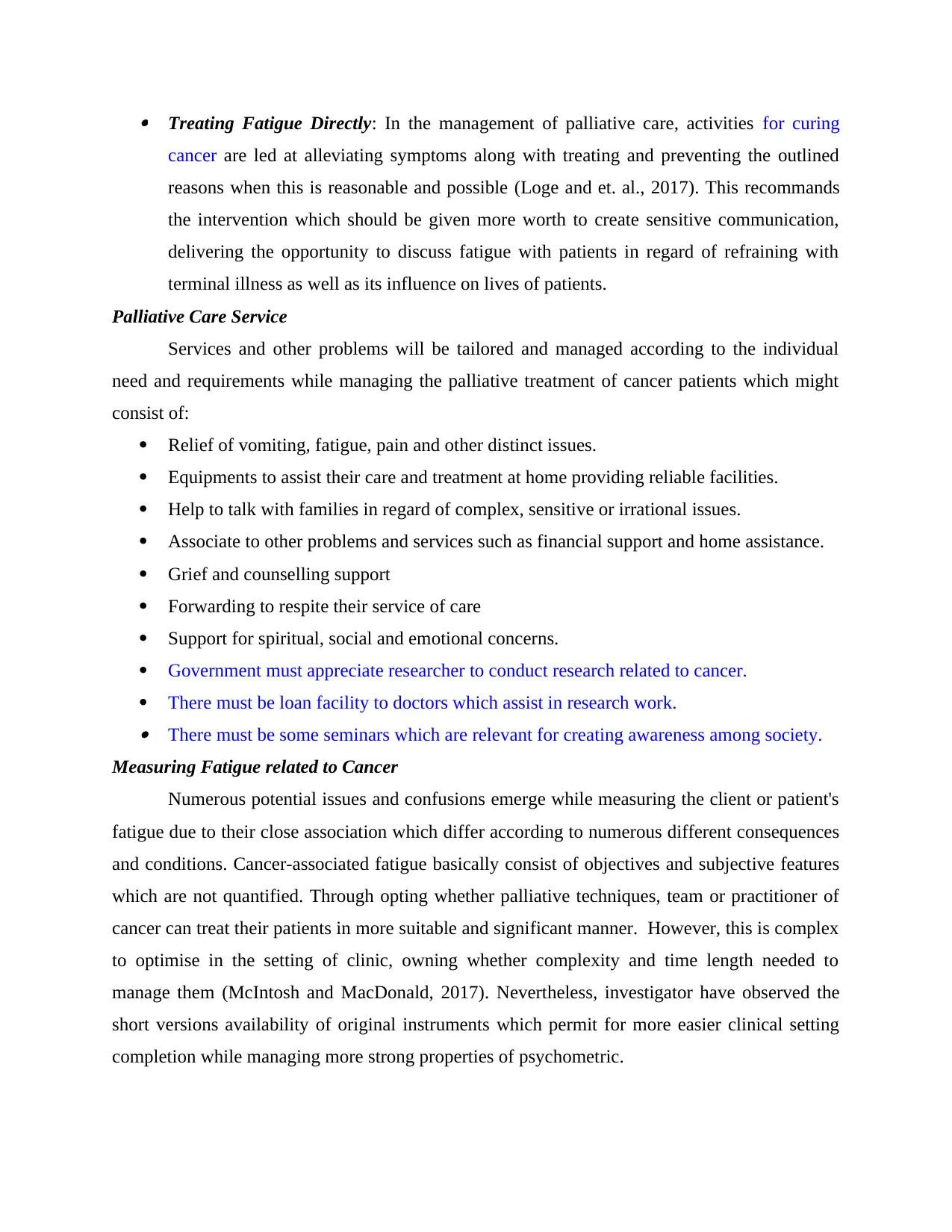
Treating Fatigue Directly: In the management of palliative care, activities for curing
cancer are led at alleviating symptoms along with treating and preventing the outlined
reasons when this is reasonable and possible (Loge and et. al., 2017). This recommands
the intervention which should be given more worth to create sensitive communication,
delivering the opportunity to discuss fatigue with patients in regard of refraining with
terminal illness as well as its influence on lives of patients.
Palliative Care Service
Services and other problems will be tailored and managed according to the individual
need and requirements while managing the palliative treatment of cancer patients which might
consist of:
Relief of vomiting, fatigue, pain and other distinct issues.
Equipments to assist their care and treatment at home providing reliable facilities.
Help to talk with families in regard of complex, sensitive or irrational issues.
Associate to other problems and services such as financial support and home assistance.
Grief and counselling support
Forwarding to respite their service of care
Support for spiritual, social and emotional concerns.
Government must appreciate researcher to conduct research related to cancer.
There must be loan facility to doctors which assist in research work. There must be some seminars which are relevant for creating awareness among society.
Measuring Fatigue related to Cancer
Numerous potential issues and confusions emerge while measuring the client or patient's
fatigue due to their close association which differ according to numerous different consequences
and conditions. Cancer-associated fatigue basically consist of objectives and subjective features
which are not quantified. Through opting whether palliative techniques, team or practitioner of
cancer can treat their patients in more suitable and significant manner. However, this is complex
to optimise in the setting of clinic, owning whether complexity and time length needed to
manage them (McIntosh and MacDonald, 2017). Nevertheless, investigator have observed the
short versions availability of original instruments which permit for more easier clinical setting
completion while managing more strong properties of psychometric.
cancer are led at alleviating symptoms along with treating and preventing the outlined
reasons when this is reasonable and possible (Loge and et. al., 2017). This recommands
the intervention which should be given more worth to create sensitive communication,
delivering the opportunity to discuss fatigue with patients in regard of refraining with
terminal illness as well as its influence on lives of patients.
Palliative Care Service
Services and other problems will be tailored and managed according to the individual
need and requirements while managing the palliative treatment of cancer patients which might
consist of:
Relief of vomiting, fatigue, pain and other distinct issues.
Equipments to assist their care and treatment at home providing reliable facilities.
Help to talk with families in regard of complex, sensitive or irrational issues.
Associate to other problems and services such as financial support and home assistance.
Grief and counselling support
Forwarding to respite their service of care
Support for spiritual, social and emotional concerns.
Government must appreciate researcher to conduct research related to cancer.
There must be loan facility to doctors which assist in research work. There must be some seminars which are relevant for creating awareness among society.
Measuring Fatigue related to Cancer
Numerous potential issues and confusions emerge while measuring the client or patient's
fatigue due to their close association which differ according to numerous different consequences
and conditions. Cancer-associated fatigue basically consist of objectives and subjective features
which are not quantified. Through opting whether palliative techniques, team or practitioner of
cancer can treat their patients in more suitable and significant manner. However, this is complex
to optimise in the setting of clinic, owning whether complexity and time length needed to
manage them (McIntosh and MacDonald, 2017). Nevertheless, investigator have observed the
short versions availability of original instruments which permit for more easier clinical setting
completion while managing more strong properties of psychometric.
⊘ This is a preview!⊘
Do you want full access?
Subscribe today to unlock all pages.

Trusted by 1+ million students worldwide
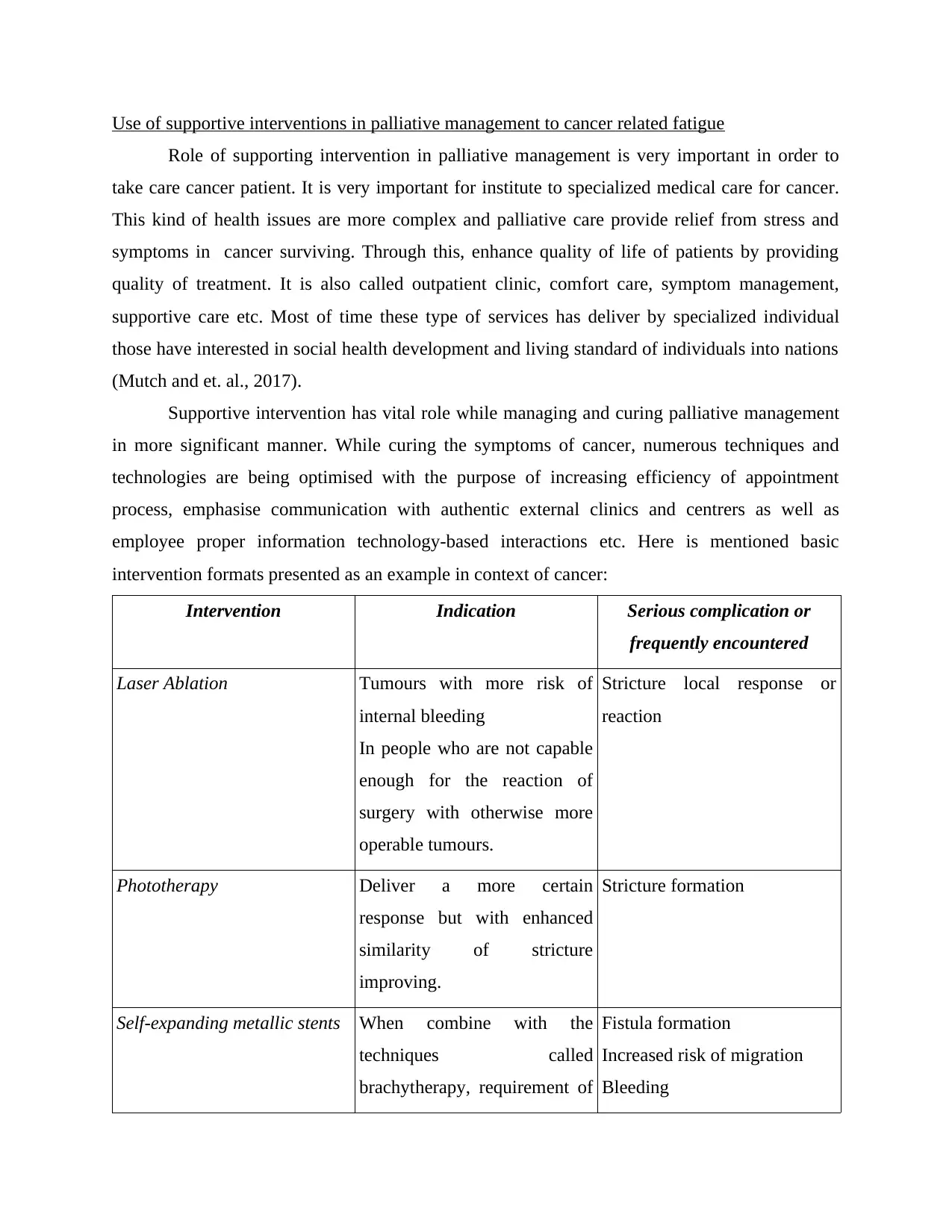
Use of supportive interventions in palliative management to cancer related fatigue
Role of supporting intervention in palliative management is very important in order to
take care cancer patient. It is very important for institute to specialized medical care for cancer.
This kind of health issues are more complex and palliative care provide relief from stress and
symptoms in cancer surviving. Through this, enhance quality of life of patients by providing
quality of treatment. It is also called outpatient clinic, comfort care, symptom management,
supportive care etc. Most of time these type of services has deliver by specialized individual
those have interested in social health development and living standard of individuals into nations
(Mutch and et. al., 2017).
Supportive intervention has vital role while managing and curing palliative management
in more significant manner. While curing the symptoms of cancer, numerous techniques and
technologies are being optimised with the purpose of increasing efficiency of appointment
process, emphasise communication with authentic external clinics and centrers as well as
employee proper information technology-based interactions etc. Here is mentioned basic
intervention formats presented as an example in context of cancer:
Intervention Indication Serious complication or
frequently encountered
Laser Ablation Tumours with more risk of
internal bleeding
In people who are not capable
enough for the reaction of
surgery with otherwise more
operable tumours.
Stricture local response or
reaction
Phototherapy Deliver a more certain
response but with enhanced
similarity of stricture
improving.
Stricture formation
Self-expanding metallic stents When combine with the
techniques called
brachytherapy, requirement of
Fistula formation
Increased risk of migration
Bleeding
Role of supporting intervention in palliative management is very important in order to
take care cancer patient. It is very important for institute to specialized medical care for cancer.
This kind of health issues are more complex and palliative care provide relief from stress and
symptoms in cancer surviving. Through this, enhance quality of life of patients by providing
quality of treatment. It is also called outpatient clinic, comfort care, symptom management,
supportive care etc. Most of time these type of services has deliver by specialized individual
those have interested in social health development and living standard of individuals into nations
(Mutch and et. al., 2017).
Supportive intervention has vital role while managing and curing palliative management
in more significant manner. While curing the symptoms of cancer, numerous techniques and
technologies are being optimised with the purpose of increasing efficiency of appointment
process, emphasise communication with authentic external clinics and centrers as well as
employee proper information technology-based interactions etc. Here is mentioned basic
intervention formats presented as an example in context of cancer:
Intervention Indication Serious complication or
frequently encountered
Laser Ablation Tumours with more risk of
internal bleeding
In people who are not capable
enough for the reaction of
surgery with otherwise more
operable tumours.
Stricture local response or
reaction
Phototherapy Deliver a more certain
response but with enhanced
similarity of stricture
improving.
Stricture formation
Self-expanding metallic stents When combine with the
techniques called
brachytherapy, requirement of
Fistula formation
Increased risk of migration
Bleeding
Paraphrase This Document
Need a fresh take? Get an instant paraphrase of this document with our AI Paraphraser
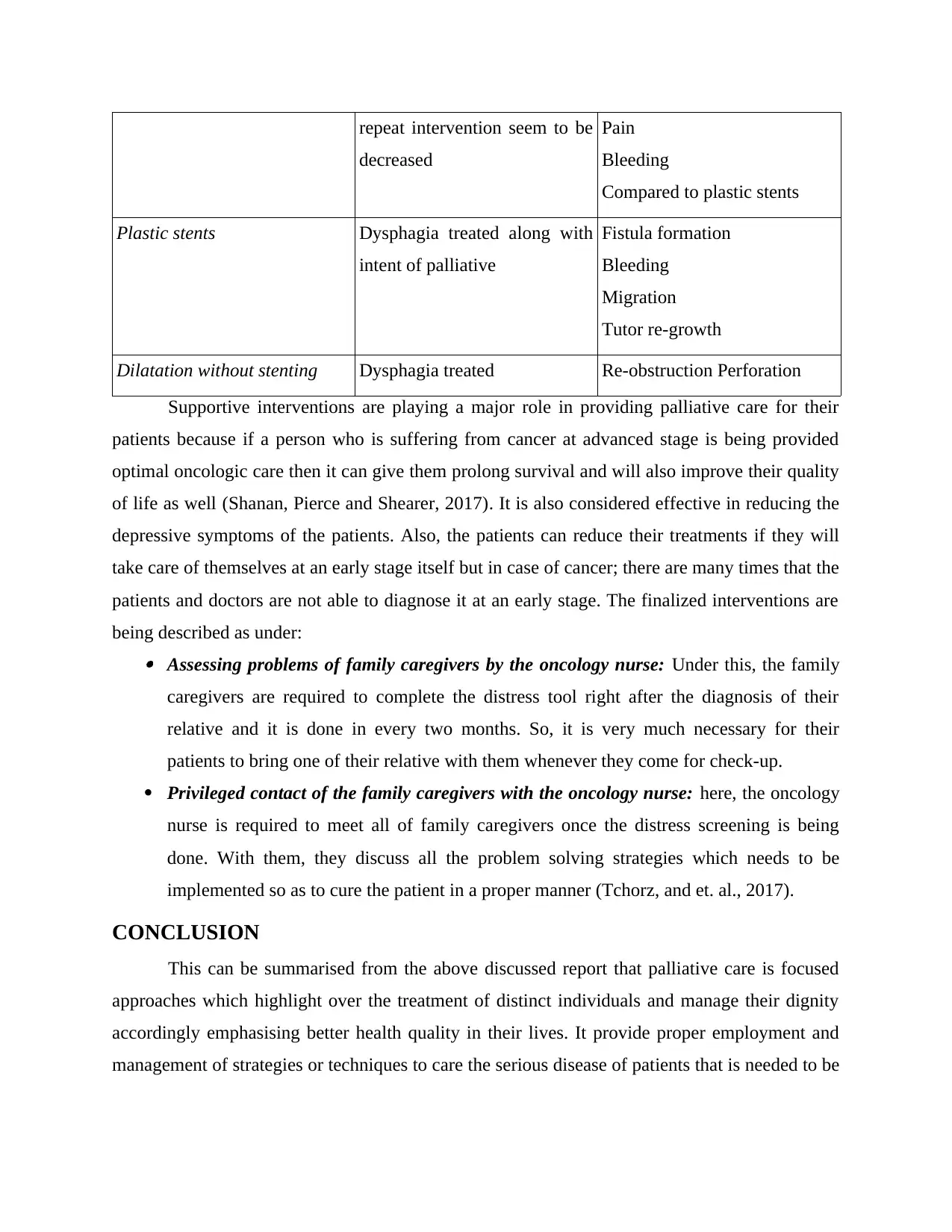
repeat intervention seem to be
decreased
Pain
Bleeding
Compared to plastic stents
Plastic stents Dysphagia treated along with
intent of palliative
Fistula formation
Bleeding
Migration
Tutor re-growth
Dilatation without stenting Dysphagia treated Re-obstruction Perforation
Supportive interventions are playing a major role in providing palliative care for their
patients because if a person who is suffering from cancer at advanced stage is being provided
optimal oncologic care then it can give them prolong survival and will also improve their quality
of life as well (Shanan, Pierce and Shearer, 2017). It is also considered effective in reducing the
depressive symptoms of the patients. Also, the patients can reduce their treatments if they will
take care of themselves at an early stage itself but in case of cancer; there are many times that the
patients and doctors are not able to diagnose it at an early stage. The finalized interventions are
being described as under: Assessing problems of family caregivers by the oncology nurse: Under this, the family
caregivers are required to complete the distress tool right after the diagnosis of their
relative and it is done in every two months. So, it is very much necessary for their
patients to bring one of their relative with them whenever they come for check-up.
Privileged contact of the family caregivers with the oncology nurse: here, the oncology
nurse is required to meet all of family caregivers once the distress screening is being
done. With them, they discuss all the problem solving strategies which needs to be
implemented so as to cure the patient in a proper manner (Tchorz, and et. al., 2017).
CONCLUSION
This can be summarised from the above discussed report that palliative care is focused
approaches which highlight over the treatment of distinct individuals and manage their dignity
accordingly emphasising better health quality in their lives. It provide proper employment and
management of strategies or techniques to care the serious disease of patients that is needed to be
decreased
Pain
Bleeding
Compared to plastic stents
Plastic stents Dysphagia treated along with
intent of palliative
Fistula formation
Bleeding
Migration
Tutor re-growth
Dilatation without stenting Dysphagia treated Re-obstruction Perforation
Supportive interventions are playing a major role in providing palliative care for their
patients because if a person who is suffering from cancer at advanced stage is being provided
optimal oncologic care then it can give them prolong survival and will also improve their quality
of life as well (Shanan, Pierce and Shearer, 2017). It is also considered effective in reducing the
depressive symptoms of the patients. Also, the patients can reduce their treatments if they will
take care of themselves at an early stage itself but in case of cancer; there are many times that the
patients and doctors are not able to diagnose it at an early stage. The finalized interventions are
being described as under: Assessing problems of family caregivers by the oncology nurse: Under this, the family
caregivers are required to complete the distress tool right after the diagnosis of their
relative and it is done in every two months. So, it is very much necessary for their
patients to bring one of their relative with them whenever they come for check-up.
Privileged contact of the family caregivers with the oncology nurse: here, the oncology
nurse is required to meet all of family caregivers once the distress screening is being
done. With them, they discuss all the problem solving strategies which needs to be
implemented so as to cure the patient in a proper manner (Tchorz, and et. al., 2017).
CONCLUSION
This can be summarised from the above discussed report that palliative care is focused
approaches which highlight over the treatment of distinct individuals and manage their dignity
accordingly emphasising better health quality in their lives. It provide proper employment and
management of strategies or techniques to care the serious disease of patients that is needed to be

managed. In regard of this, this is fundamental to also prepare and design proper intervention
plan in more significant manner.
plan in more significant manner.
⊘ This is a preview!⊘
Do you want full access?
Subscribe today to unlock all pages.

Trusted by 1+ million students worldwide
1 out of 12
Related Documents
Your All-in-One AI-Powered Toolkit for Academic Success.
+13062052269
info@desklib.com
Available 24*7 on WhatsApp / Email
![[object Object]](/_next/static/media/star-bottom.7253800d.svg)
Unlock your academic potential
Copyright © 2020–2025 A2Z Services. All Rights Reserved. Developed and managed by ZUCOL.





